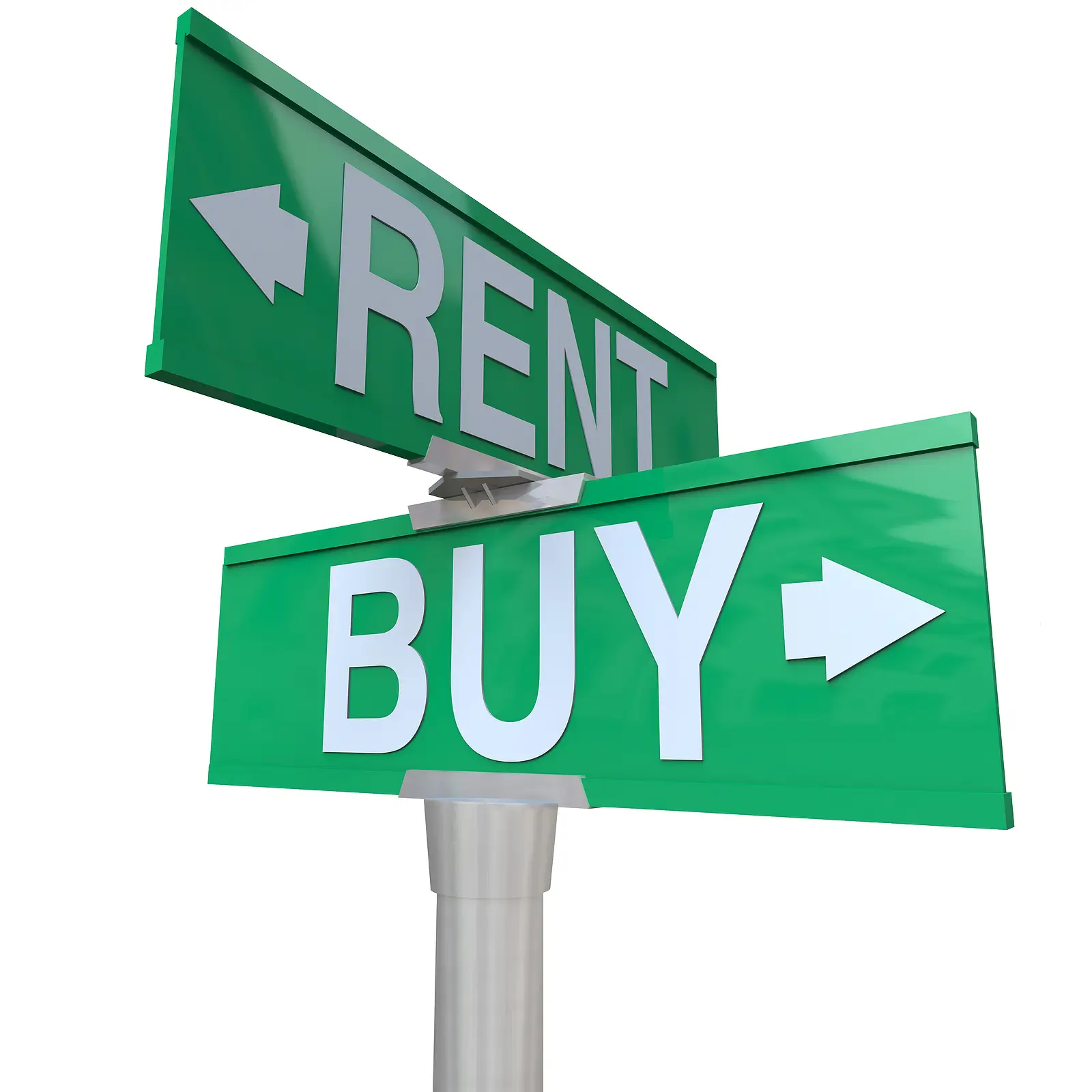Buying a home in Oregon has never felt more complicated. Prices have cooled in some areas, but mortgage rates remain high. At the same time, rent keeps rising in cities like Portland, Bend, and Eugene. The gap between the cost of renting and owning keeps shifting, and for many, the right move isn’t obvious.
This article explores what homes and rentals actually cost in 2025 and how interest rates are shaping those costs.
The better choice depends on your plans. If you're staying in one place and the monthly cost works for your budget, buying could be the stronger option.
Keep reading to see how today’s market numbers stack up and what they mean for you.
Key Takeaways
- Renting is more affordable than buying in many Oregon cities in 2025.
- High mortgage rates (around 6.5%–7%) are keeping monthly buying costs elevated.
- Oregon’s average rent is $1,945, while homeownership often exceeds $3,500/month.
- Zillow forecasts modest home price changes and slower rent growth into 2026.
- New housing construction is underway, but inventory remains limited in key areas.
What’s the Average Cost to Rent in Oregon?
According to Zillow’s June 2025 data, the average rent in Oregon is $1,945 per month. That’s about 3% higher than in 2024. In cities like Portland, Eugene, and Bend, the rent is even higher.
Here’s a quick look at average monthly rents:
- Portland: $2,050
- Eugene: $1,725
- Bend: $2,300
- Salem: $1,600
Rental prices also depend on unit size and location. One-bedrooms cost less, but high-demand neighborhoods charge more. Many renters also face pet fees, parking costs, and rising utility bills.
What’s the Average Cost to Buy a Home in Oregon?
Oregon home prices have leveled off in 2025. After years of rapid growth, the market has cooled. According to Zillow, the typical home value in Oregon is $507,256 as of June 30, 2025. That’s flat compared to last year, showing a 0.0% annual change.
Here's a snapshot of current median home values in key cities:
- Portland: $543,785
- Eugene: $483,592
- Bend: $740,901
- Salem: $454,472
Prices vary by neighborhood, but all four cities remain more expensive than the state average. Bend, in particular, has some of the highest home prices in Oregon.
Compared to 2020–2022, when values were rising 8% or more per year, today’s growth is slower. That’s mostly due to high interest rates and tighter affordability.
Renting vs. Buying: Monthly Cost Breakdown
Let’s say you’re choosing between renting for $1,945 or buying a $486,500 home. Here’s a sample breakdown of monthly expenses:
Renting:
- Rent: $1,945
- Renters Insurance: $20
- Utilities: $200
Total: $2,165
Buying:
- Mortgage (10% down, 6.75% interest): ~$2,850
- Property Tax (estimated at 1.1% annually): ~$445
- Home Insurance: ~$100
- Maintenance & Repairs: ~$200
Total: ~$3,595
That’s a monthly difference of about $1,430. Buying costs more upfront and monthly. But it builds equity over time.
What Do Studies Say About Renting vs. Buying?
The Urban Institute’s 2024 report found that renting is cheaper than owning in 56% of U.S. metro areas, including many in Oregon. Portland was listed as one of the top cities where renting is currently more affordable on a month-to-month basis.
However, that doesn’t mean renting is better long-term. The same study noted that homeowners have 40 times more wealth than renters on average, mostly due to equity growth.
If your goal is to save money monthly, renting wins. If you want to build long-term wealth, buying a home can help. But it only works if you can afford the costs and plan to stay in the home for at least five years.
How Interest Rates Affect the Math
Mortgage rates matter more than ever in 2025. In early 2021, rates were around 3%. Now, they sit between 6.5% and 7%. That makes a big difference.
For example, the same $486,500 home with a 3% interest rate would cost about $2,300/month instead of $2,850+. That’s a $550 swing.
Rates may drop in 2026, but they’re not expected to return to pandemic lows anytime soon. For many Oregon buyers, today’s rates price them out of ownership unless they have strong income or large savings.
Rent May Seem Cheaper, But It’s Not “Wasted Money”
A lot of people think rent is money down the drain. But that’s not always true.
Rent gives you flexibility. You don’t pay property tax or repairs. You can move when needed. And you’re not locked into a long-term mortgage at a high interest rate.
Plus, if you invest what you save from not buying (say, $1,000/month), you could still grow wealth in other ways. A smart renter can stay ahead, especially in a market like Oregon where ownership is expensive.
But Buying Offers Long-Term Benefits
That said, owning a home still comes with key advantages:
- Stability: Your mortgage won’t rise every year like rent might.
- Equity: You build value with every payment.
- Tax perks: Mortgage interest and property taxes may be deductible.
- Freedom: You can renovate, rent it out, or sell when the value grows.
Oregon’s housing market is competitive. The best time to buy is when it fits your budget. Don’t buy just because it feels like the “right time.”
What About the Oregon Housing Market Outlook?
According to the Oregon Office of Economic Analysis, housing construction is picking up. More units are expected in Portland, Eugene, and surrounding suburbs. Still, inventory remains tight.
Zillow’s latest national forecast expects home prices to decline slightly, between 0.9% and 1.7%, by early 2026. While this isn't broken down by state, Oregon is likely to follow a similar trend, with price movement depending on local supply and demand. In cities adding new housing, prices may stabilize or dip slightly.
Rent growth is also expected to slow, especially in Oregon areas seeing new multifamily developments, like Portland and Eugene.
For renters, this may offer some relief as new units help moderate rent growth. Buyers, on the other hand, might benefit from softening prices and better negotiating power later in the year.
So, Is It Cheaper to Rent or Buy in Oregon in 2025?
In most cases, renting is cheaper, right now. Monthly rent is lower than a mortgage in nearly every Oregon city, especially when interest rates hover near 7%.
But buying is still worth it for some. If you plan to stay long-term, can afford the upfront costs, and lock in a decent rate, buying builds equity and offers more control.
Here’s a quick way to decide:
- Rent if you need flexibility, plan to move soon, or can’t afford high monthly costs.
- But buy if you’re staying put, have stable income, and want to grow long-term wealth.
Rent or Buy, Make the Decision That Fits You Best
There’s no one-size-fits-all answer. The Oregon housing market is still pricey, and high mortgage rates tilt the scales toward renting, for now.
But things change. Rates may dip. Inventory may rise. And your finances may grow stronger.
If you’re on the fence, run the numbers. Talk to a local lender or housing advisor. And make the choice that fits your real life, not just the market trends.
PMI Central Oregon is here to help you make confident real estate decisions. As a full-service real estate asset management company, we provide expert residential and commercial property management and brokerage services. With real-time technology and a focus on client success, we make property management manageable.
FAQ: Renting vs. Buying in Oregon
1. How do property taxes compare to rent in Oregon?
Property taxes vary by county, but homeowners in Oregon generally pay around 1% of their home’s assessed value each year. This adds a significant cost to monthly ownership that renters don’t have to worry about. Always factor this into your buy vs. rent decision.
2. Are first-time homebuyer programs available in Oregon?
Yes. Oregon offers several first-time homebuyer assistance programs, including down payment support and favorable loan terms through the Oregon Housing and Community Services (OHCS). These can make buying more accessible if you're eligible.
3. Can I negotiate rent prices in Oregon?
In many cases, yes—especially if a unit has been vacant for a while or you're renewing your lease. It helps to research local rental trends and come prepared with data. Some landlords may offer incentives like a free month or reduced deposit.


